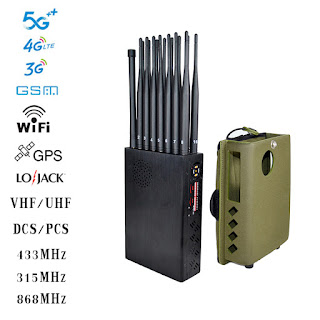Marines Need Rifle-Mounted Jammers to Help Infantrymen Fight Drones
The Marine Corps is on the hunt for electronic warfare attachments, "buckshot-like" ammunition, and advanced optics for its standard-issue rifle to help dismounted troops track and defeat incoming drones, according to a recent announcement from the service.
The notice seeking sources, published July 15 by Marine Corps Systems Command, details plans to field several new attachments to troops at the squad and platoon level to mount on their M27 Infantry Automatic Rifles in order to "support 'every' Marine's ability to conduct self-defense against threat Groups 1 and 2 small UAS [unmanned aerial systems]," drones that weigh 20 pounds or less and between 21 and 55 pounds, respectively.
Those attachments include a "directional RF [radio frequency] and/or Global Positioning System gps jammer" designed to interfere with the signals drones use to communicate
Rather than have dismounted troops to rely on bulky and unwieldy stand-alone hand-held, counter-drone jammer, the emphasis on mounting these new attachments on an "organic" (read: essential) rifle reflects a need for systems that have "little to no impact on [Marines'] primary mission," as the notice puts it.
For the advanced rifle optics, the most likely candidate for Marines is the SMASH 2000L fire control system from Israeli defense contractor SmartShooter, which allows troops to "lock on" to an incoming drone target for a "guaranteed hit." The Marine Corps has been testing the system since 2021 but has yet to field it across the broader close-combat force.
The Marine Corps Warfighting Lab "has provided a limited quantity of the [SmartShooter] SMASH 2000L optics to a small number of Marine Corps units for experimentation," a battle lab spokesperson told Military.com. "The optic has not been provided by the program office for use in Marine Corps training, nor has it been provided to deployed units."
For the average grunt, it's unclear how much weight these new devices will add to their rifle and, in turn, how that might affect its use on the battlefield.
The M27 weighs 9.8 pounds loaded with a 30-round STANAG magazine and outfitted with a sling. The addition of the Corps' new Squad Common Optic (2 pounds), a rail-mounted AN/PEQ-16 laser illuminator (9.9 ounces), and a standard Knights Armament suppressor (1.4 pounds) results in a 13.8-pound weapon -- just under the weight of the noticeably heavy XM7 Next Generation Squad Weapon rifle the Army recently started fielding.
Beyond these rifle add-ons, the Corps is also searching for "enhanced ammunition for existing firearms," namely "buckshot-like" rounds for the service's arsenal of rifles chambered in 5.56x45mm and 7.62x51mm, such as the M110 Semi-Automatic Sniper System, as well as for its M2 .50-caliber machine guns and 40mm grenade launchers.
Details about the new ammunition were not immediately available, but as recently as April Marines have engaged in counter-drone training with shotguns, alongside other "direct fire" weapons such as rifles and machine guns.
A Marine Corps Systems Command spokesperson did not immediately respond to a request for comment Tuesday.
Conventional militaries and non-state actors have increasingly menaced U.S. and allied forces with low-cost, weaponized drones in recent years, a development that had previously prompted Marine Gen. Kenneth McKenzie Jr., the former head of U.S. Central Command, to dub them the most dangerous threat to American forces in the Middle East since the advent of the improvised explosive device at the dawn of the Global War on Terror.
While the Marine Corps is working overtime to field several vehicle-mounted counter-drone solutions such as the vehicle-mounted Light Marine Air Defense Integrated System, or L-MADIS, the new push to equip grunts with easy-to-carry systems is part of the service's broader effort to make every Marine a drone defender at a time when some units are currently deploying to geopolitical hot spots such as the Indo-Pacific without such capabiilties.
"Every unit down to the individual Marine, regardless of geographic location on the battlefield, is vulnerable to reconnaissance and, more dangerously, attack from threat Groups 1 and 2 small UAS," according to the notice. "To facilitate freedom of movement, Marines require the ability to conduct self-defense against the threat."



Comments
Post a Comment